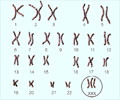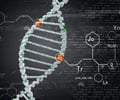Research on Down syndrome must focus more on the roles that genes play than the effect of the extra chromosomes.

How Does Down Syndrome Happen?
Every cell starts with extra chromosomes during early embryogenesis; however, this DNA gets sorted into pairs after about a week of growth. When this process goes awry, it often leads to the death of the embryo, with only a few being able to survive with the extra DNA, like in the case of Down syndrome.‘Understanding the complex nature of Down syndrome should allow us to see the bigger picture and not get stuck focusing on a single gene.’





By taking a step back and looking at the entire cell, researchers were able to create a new understanding of these syndromes. Researchers took a critical look at recent evidence suggesting that Down syndrome phenotypes arise not only because of increased dosage of genes on chromosome 21 but also because of global effects of chromosome gain.They sifted through published datasets of proteins and RNA from individuals with Down syndrome and compared these to laboratory-made cells with trisomies of chromosomes 3, 5, 12, and 21.The researchers discovered that regardless of which chromosome was in excess, the cells all had a reduced ability to replicate, survive, and maintain their DNA.
Discovering More from Down Syndrome Research
Later, researchers were interested in finding out why cells with imbalanced chromosomal content𡟙n other words, aneuploid cells 㻡re capable of surviving. It was particularly exciting for them to learn if viable aneuploid embryonic cells have similarities with aneuploid cancer cells or cell lines, derived in the laboratory.Additionally, they found that the adaptive T-cell immune system was underdeveloped in all cells, while the innate immune system seemed to be overactive. They suggest that this is a consequence of general chromosome gain. This research can be expanded into autoimmune diseases, such as Alzheimer's disease or acute leukemias in trisomy Chr. 8 or 21, that also exist without any connection to aneuploidy.
Researchers hope that the work elucidating a complex trisomy phenotype should help to improve development in children affected by these diseases.
Advertisement













